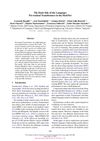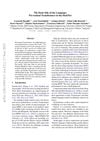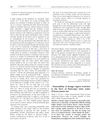
Search
for
Sort by
Research
30-60 / 71 results

research Male Sex Hormones in Andrology Today
Testosterone is key for male sexual function, and treating hormone imbalances can improve sexual issues.

research The Dark Side of the Language: Pre-Trained Transformers in the DarkNet
Pre-trained Transformers need extreme retraining to perform well on DarkNet data.

research The Dark Side of the Language: Syntax-Based Neural Networks Rivaling Transformers in Unseen Sentences
Syntax-based neural networks can match Transformers in handling unseen sentences.

research Long-Term Oral Administration of 5α-Reductase Inhibitor Attenuates Erectile Function by Inhibiting Autophagy and Promoting Apoptosis of Smooth Muscle Cells in Corpus Cavernosum of Aged Rats
Long-term use of a certain medication can worsen erectile function in aged rats by damaging penile muscle cells.

research Consequences of Steroid-5α-Reductase Deficiency and Inhibition in Vertebrates
Lack or blocking of SRD5a, a key component in hormone creation, can lead to conditions like pseudohermaphrodism and affect hair growth, bone mass, muscle strength, and reproductive health. More research is needed on its regulation from fertilization to adulthood.

research Exploring Rat Corpus Cavernosum Alterations Induced by Finasteride Treatment and Withdrawal
Finasteride changes hormone levels and certain proteins in rats, but these effects can be reversed after stopping the drug.

research Persistent Sexual and Nonsexual Adverse Effects of Finasteride in Younger Men
Finasteride can cause sexual problems and depression in young men.

research Persistent Sexual Side Effects of Finasteride: Could They Be Permanent?
Finasteride may cause long-lasting sexual side effects.

research Treatment of Recurrent Priapism in Sickle Cell Anemia With Finasteride: A New Approach
Finasteride helps reduce priapism in sickle cell anemia patients.

research Investigation by Imaging Mass Spectrometry of Biomarker Candidates for Aging in the Hair Cortex
Certain molecules in hair change with age and could be used for cosmetic treatments.

research A Randomized Placebo-Controlled Single-Center Pilot Study of the Safety and Efficacy of Apremilast in Subjects with Moderate-to-Severe Alopecia Areata
Apremilast was not effective in treating moderate-to-severe alopecia areata.

research Prostaglandin-Induced Hair Growth
Latanoprost can make eyelashes longer, thicker, and darker.

research The Impact of the 5α-Reductase Inhibitors on Male Sexual Function and Psychological Well-Being
5α-reductase inhibitors can cause serious and possibly lasting sexual and psychological side effects.

research Association Between Insulin Resistance and Cardiovascular Risk Factors in Polycystic Ovary Syndrome Patients
Insulin resistance is common in PCOS patients and linked to obesity and increased cardiovascular risk.

research Frontal Fibrosing Alopecia and Lichen Planus Pigmentosus
Mycophenolic acid may help hair growth, a combination treatment improves hair thickness in male hair loss, and early treatment of frontal fibrosing alopecia is important.

research Multisystemic Eosinophilic Epitheliotropic Disease in a Horse in Brazil
A horse in Brazil with skin and gut issues was diagnosed with a severe disease and had to be euthanized.

research Assessment of Digital Screen Use by Children and Adolescents During the Pandemic
Children's screen time increased during the pandemic, causing various health issues.

research Overview of Ultrasound Imaging Applications in Dermatology
Ultrasound is a useful, non-invasive tool in dermatology for diagnosing skin conditions and guiding treatments, but it has some limitations.

research Clinical Improvements in Erectile Function and Mood in Hypogonadal Men Treated with 4.5% Nasal Testosterone Gel (Natesto)
Natesto nasal gel improves erectile function and mood in men with low testosterone within 30 days.

research Female Sexual Dysfunction: Prevalence, Causes, and Treatments
Many women experience sexual dysfunction, but few seek help, and better treatment and medical training are needed.

research Short-Acting Intramuscular Testosterone Delivered in the Clinic Setting Remains a Key Patient-Friendly and Patient-Directed Option in the Contemporary Management of Hypogonadism
Short-acting testosterone injections in a clinic are a preferred treatment for low testosterone because they work well, are convenient, and patients stick with the treatment.

research V Congress of the Portuguese Society of Cosmetological Sciences - Proceedings
The congress showed advancements in skin hydration, barrier function, and safe, effective new cosmetic formulations.

research Clinical and Nutritional Aspects in Obese Women During the First Year After Roux-en-Y Gastric Bypass
The surgery effectively promoted and maintained weight loss in obese women during the first year.

research Metformin Influence on Hormone Levels at Birth in PCOS Mothers and Their Newborns
Metformin taken during pregnancy increases SHBG in newborns but doesn't change other hormone levels in mothers or babies.

research Patentability of Dosage Regime Invention in the Form of Swiss-Type Claim Under Chinese Patent Law
Dosage regime inventions can be patentable in China, but legal uncertainty exists.

research Amniotic Allograft Implantation for Midface Aging Correction: A Retrospective Comparative Study with Platelet-Rich Plasma
Amniotic allograft may be more effective than platelet-rich plasma for midface aging treatment.
research A Narrative Review of the Research Progress and Clinical Application of Platelet-Rich Plasma
PRP shows promise in healing but needs a standardized, safe preparation method.

research Study of 2 Nutritional Supplements (Capsules and Spray) in the Treatment of Female Alopecia. KAIDAX Study
Two nutritional supplements improved hair growth and reduced hair loss in women with hair loss conditions.

research Diabetic Foot in Primary Care: A Literature Review
The document concludes that Passiflora incarnata could help with anxiety, telemedicine might improve heart failure care, screen time for kids has increased, pregnant teens in Brazil are mostly okay with their body image, rare tuberculosis infection can occur after knee surgery, older and severely ill people are more likely to have long COVID-19 symptoms, HPLC might diagnose more diabetes cases, and psychiatrists should be involved in pain management.